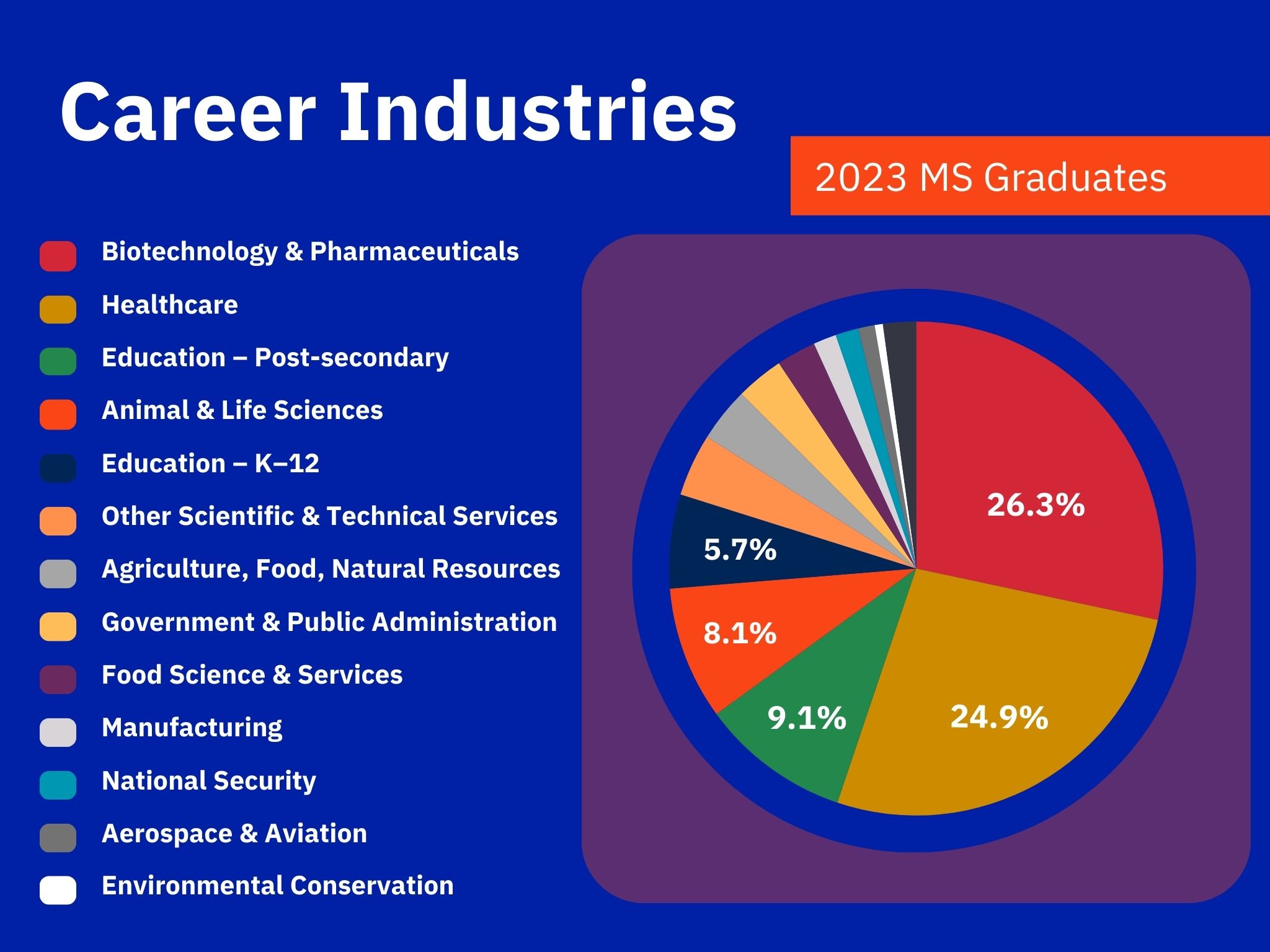Microbiology Career Outlook
Our Master of Science in Microbiology and Cell Science graduates of 2023 were polled on their career plans following graduation. Given that the majority of our online master’s students are working adults, it was unsurprising to see 80% of the graduates had already secured employment.
“For 25 to 34 year olds who worked full time, higher educational attainment was associated with higher median earnings.” – National Center for Education Statistics
According to the National Center for Education Statistics, the median earnings for those with at least a master’s degree in any subject were $74,600, which is 21% higher than those with a bachelor’s degree at $61,600. Many of our students choose to complete a master’s degree in order to advance their careers. So, what are our graduates working on?

Biotechnology and pharmaceutical industry
The majority of our graduates have careers in the biotechnology and/or pharmaceutical industry. This means they could have a variety of different jobs. Jobs in this industry include but are not limited to:
- Research
- Data Science
- Quality Assurance
- Regulatory Affairs
- Medical Affairs
- Project Management
- Pharmaceutical/Technology Sales
- Technical/Medical Writing
“About 17,700 openings for data scientists are projected each year, on average, over the decade.” – U.S. Bureau of Labor Statistics
Data scientists use statistical analysis tools and techniques like we teach in our Bioinformatics and Microbiological Data Analysis courses to extract meaningful insights from typically very large datasets. The job market for data scientists is predicted to grow 35% over the next 10 years according to the U.S. Bureau of Labor Statistics. With a median pay in 2022 of $103,500 per year, the industry clearly needs people who are trained in data analysis.
Healthcare
Nearly 25% of our master’s degree graduates have careers in the healthcare industry. The healthcare industry is a vast amalgamation of human-centric preventative, curative, rehabilitative, and palliative care. With a master’s degree in microbiology with a concentration in medical microbiology, job prospects could include but are not limited to:
- Clinical Research
- Clinical Trial Administration
- Microbiology
- Epidemiology
- Medical Technology
- Diagnostic Technology
“Employment of epidemiologists is projected to grow 27 percent from 2022 to 2032, much faster than the average for all occupations.” – U.S. Bureau of Labor Statistics
Epidemiologists use statistical tools to study public health and disease on a population level. Many epidemiologist positions require experience working with big data, machine learning and artificial intelligence methods like we teach in our AI in Agriculture and Life Sciences, Microbiological Data Analysis and Computational Genomics and Epigenomics courses. Machine learning and artificial intelligence will play an important role in the future of public health.
Teaching
A combined 14.8% of our master’s degree graduates have careers in education, either at the K–12 or postsecondary levels. The Master of Science in Microbiology and Cell Science or a graduate certificate in Environmental Microbiology, Medical Microbiology or Microbiome and Health at the University of Florida are how many teachers specialize in a subject or advance their careers. According to the National Education Association, the average top salary for a teacher with a master’s degree ($76,540) is over $15,000 more a year than the average top salary for a teacher with a bachelor’s degree ($60,381) in the United States.
- Community College Professor
- University Lecturer
- Primary and Secondary School Teacher
“I taught environmental science, anatomy, biology and AP bio in a high school. Then I took a few years off to stay at home with our three kids…The master’s degree and content I learned helped me acquire a professor position at a local community college.” – Rebekkah Schmidt, M.S.
Former high school teacher and online Master of Science in Microbiology and Cell Science graduate Rebekkah Schmidt leveraged her degree into a career as a community college professor. Teaching is one of the most authentic ways to impact the future of science.
At A Glance
- Admission Requirements
- Application Deadlines and Critical Dates
- Entirely online
- Classes offered spring, summer and fall
- No GRE requirement!
Programs
Tuition
- $535.00 per credit hour plus fees
Application Procedure
- Complete the Application Intent form
- Complete the Graduate Application
- Send your Transcripts

.png)